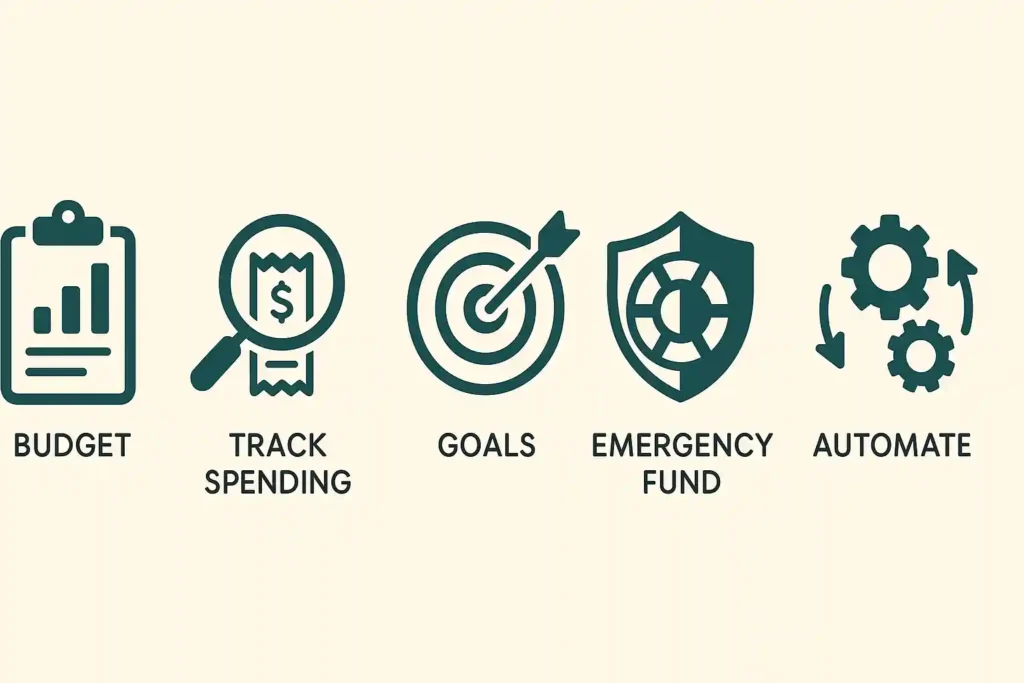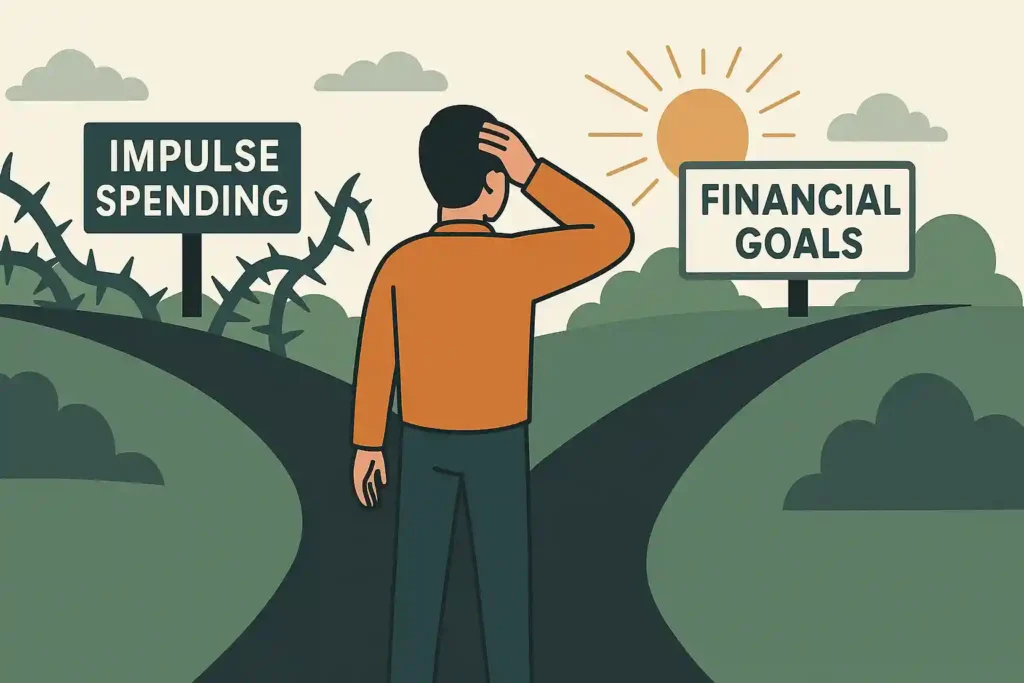Do you ever feel like you know what you should be doing with your money – saving more, spending less, sticking to a budget – but actually doing it feels like a constant battle? Maybe impulse buys derail your best intentions, or you end the month wondering where your paycheck went? If so, you’re grappling with a common challenge: financial discipline. It’s often the missing link between knowing better and doing better with your finances.
But here’s the good news: financial discipline isn’t an innate trait you’re either born with or not. It’s a skill, a muscle that can be developed with practice and the right strategies. This guide will demystify money discipline, explain why it’s absolutely crucial for your well-being, and provide practical, actionable financial discipline tips and mindset shifts to help you gain control, reduce stress, and finally start achieving your financial goals.

Table of Contents
Defining Financial Discipline: Beyond Just Budgeting
So, what does “financial discipline” truly mean? It’s more profound than simply having a budget spreadsheet.
It’s About Choices: The Core of Money Discipline
At its heart, financial discipline is the ability to consistently make financial choices that align with your long-term goals and values, even when faced with temptation or short-term desires. It involves:
- Controlling impulses to spend money you hadn’t planned to spend.
- Prioritizing future goals (like saving or debt payoff) over immediate gratification.
- Sticking to your financial plan (like a budget) consistently.
- Making conscious decisions about where your money goes, rather than letting it drift away.
It’s the bridge between your financial intentions and your financial actions.
Why We Struggle: The Psychology Behind Financial Indiscipline
Developing discipline with money can be tough because we’re often fighting against our own psychology:
- Instant Gratification: Our brains are often wired to prefer immediate rewards (buying that new gadget now) over larger, delayed rewards (a secure retirement later).
- Emotional Spending: Using spending to cope with stress, boredom, sadness, or even celebration can derail financial plans.
- Decision Fatigue: Making numerous financial choices daily can deplete willpower, leading to easier, often less optimal, choices later.
- Social Pressure: Comparing ourselves to others or feeling obligated to keep up with social spending norms.
- Lack of Clarity: Without clear goals or a plan, it’s hard to stay motivated or know what choices to make.
Understanding these psychological hurdles is the first step to overcoming them. Reputable resources on behavioral economics, like those sometimes offered by universities or consumer protection agencies, delve deeper into these concepts.
Financial Discipline vs. Restriction: A Mindset Shift
Many people view financial discipline negatively, associating it with deprivation, sacrifice, and missing out. This mindset makes it harder to stick with! It’s crucial to reframe:
- Financial discipline isn’t about restricting yourself from everything fun.
- It’s about empowering yourself to afford the things that truly matter.
- It’s about freedom – freedom from debt, freedom from financial stress, freedom to pursue your dreams.
Think of it as intentionality and control, not punishment.
Why Cultivating Discipline with Money is Non-Negotiable
Making the effort to build financial discipline pays off immensely in nearly every aspect of life.
- Achieving Short-Term and Long-Term Financial Goals: Discipline provides the consistency needed to save for vacations, down payments, retirement, education, or anything else you aspire to.
- Reducing Financial Stress and Anxiety: Knowing you have a plan, are making progress, and can handle unexpected bumps significantly lowers money-related stress.
- Building Wealth and Financial Security: Consistent saving and investing, fueled by discipline, is the cornerstone of long-term wealth creation.
- Avoiding Debt Traps: Discipline helps prevent impulsive borrowing and ensures debts are managed strategically rather than spiraling out of control.
- Gaining Control and Freedom: Ultimately, financial discipline gives you control over your money, which translates to more freedom and choices in your life.
Where Do You Stand? A Financial Discipline Self-Check
Before building, assess your starting point. Be honest with yourself.
Signs of Strong Financial Discipline:
- You regularly track your spending and stick to a budget (most of the time).
- You consistently save a portion of your income.
- You prioritize paying bills on time and managing debt effectively.
- You can delay gratification for larger financial goals.
- You rarely make significant impulse purchases you later regret.
- You have an emergency fund.
- You feel generally in control of your finances.
Red Flags: Indicators of Weak Money Discipline:
- Frequent impulse buying.
- Living paycheck-to-paycheck despite adequate income.
- Not knowing where your money goes each month.
- Struggling to save money consistently.
- Accumulating high-interest credit card debt.
- Making spending decisions based on emotions rather than needs or goals.
- Feeling stressed or anxious about money regularly.
Identifying Your Personal Triggers for Indiscipline: What situations or emotions tend to lead you off track financially?
- Stress or boredom?
- Social media influence?
- Payday “celebrations”?
- Specific stores or online shops?
- Peer pressure? Recognizing your triggers is key to managing them.
The Building Blocks: Essential Financial Discipline Tips
Ready to build that discipline muscle? Start with these foundational practices:

- Tip 1: Create a Realistic Budget (Your Roadmap): You need a plan. Whether it’s 50/30/20, zero-based, or another method, create a budget that reflects your income, expenses, and goals. Make it realistic, not overly restrictive.
- Tip 2: Track Your Spending (Awareness is Key): Use an app, spreadsheet, or notebook to monitor where your money actually goes for a month or two. Awareness is the first step toward change.
- Tip 3: Set Clear, SMART Financial Goals (Your ‘Why’): Define specific, measurable, achievable, relevant, and time-bound goals. Knowing why you need discipline provides powerful motivation. (See our guide on [Setting Financial Goals]).
- Tip 4: Build an Emergency Fund (Your Safety Net): Having 3-6 months of essential expenses saved protects you from unexpected costs derailing your progress and reduces the temptation to use credit cards in emergencies.
- Tip 5: Automate Savings & Investments (“Pay Yourself First”): Set up automatic transfers from your checking account to savings, retirement, and investment accounts right after you get paid. This makes saving effortless and non-negotiable.
Training the Muscle: Developing Lasting Money Discipline
Foundations are set, now let’s strengthen that discipline:
- Habit Building: Start Small and Be Consistent: Don’t try to change everything overnight. Pick one small habit (e.g., tracking spending daily, packing lunch once a week) and practice it consistently until it becomes automatic before adding another. Small wins build momentum.
- Delayed Gratification Exercises: Practice resisting immediate wants.
- The 24-Hour Rule: For non-essential purchases, wait 24 hours before buying. The urge often fades. Extend this to 7 or 30 days for larger items.
- Visualize the Trade-Off: When tempted, consciously visualize the goal that purchase would take money away from.
- Identify & Manage Spending Triggers: Once you know your triggers (stress, boredom, social media), create coping strategies that don’t involve spending (e.g., go for a walk, call a friend, meditate, unsubscribe from tempting emails).
- Visualize Your Goals Regularly: Keep your goals visible (written down, vision board). Regularly imagine achieving them and the positive feelings associated with that success. This reinforces your ‘why’.
- Practice Mindful Spending: Before buying, ask: Is this a need or a want? Does it align with my goals/values? Can I afford it comfortably within my budget? Could I find it cheaper or used?
- Find an Accountability Partner or System: Share your goals and progress with a trusted friend, family member, or financial planner. Use apps that track progress and send reminders. Public commitment can increase follow-through.
- Educate Yourself Continuously: The more you understand personal finance (budgeting, investing, debt), the more confident and disciplined you’ll likely become. Utilize reputable resources. (Government sites like ConsumerFinance.gov (https://www.consumerfinance.gov/) or Investor.gov (https://www.investor.gov/) offer unbiased financial education).
Staying the Course: Navigating Hurdles to Financial Discipline
Building discipline with money is a journey with inevitable bumps. Here’s how to handle them:
- Dealing with Impulse Buying Urges: Recognize the urge. Pause. Use your delayed gratification technique (24-hour rule). Remind yourself of your goals. If online shopping is a trigger, remove saved payment info or use website blockers during vulnerable times.
- Handling Unexpected Expenses Without Derailing: This is what the emergency fund is for! Use it as intended, then focus on replenishing it without guilt. Don’t let an emergency justify abandoning your entire plan.
- Staying Motivated When Progress Feels Slow: Review how far you’ve come, not just how far you have to go. Break large goals into smaller milestones and celebrate achieving them. Reconnect with your “why”.
- Managing Social Pressure to Spend: It’s okay to say “no” to expensive outings or suggest more affordable alternatives. True friends will understand your financial priorities. Be confident in your choices.
- Getting Back on Track After Slipping Up (Forgiveness & Reset): Everyone makes mistakes. Don’t let one budget slip-up or impulse buy lead to completely giving up. Acknowledge it, learn from it, forgive yourself, and get back on track with your next decision. Progress, not perfection, is the goal.

Common Questions About Building Money Discipline
Let’s address some frequently asked questions:
- Is financial discipline something you’re born with? No! While some personality types might find it easier initially, financial discipline is fundamentally a set of learned behaviors and habits. Anyone can improve their money discipline with conscious effort and practice.
- How long does it take to develop financial discipline? It varies. Building new habits takes time – often weeks or months of consistent practice for them to feel automatic. Be patient with yourself. Focus on consistent small actions rather than expecting overnight transformation.
- Can I still have fun if I have financial discipline? Absolutely! Financial discipline isn’t about deprivation; it’s about intentionality. By controlling mindless spending, you free up resources for the fun things that truly matter to you and align with your goals, guilt-free. You budget for fun!
- What’s the single most important tip for improving money discipline? While many tips are crucial, automating your savings and investments (“Pay Yourself First”) is often cited as one of the most powerful. It takes willpower out of the equation for a significant part of your financial plan. Tracking spending is a close second for building awareness.
- What if my partner lacks financial discipline? This requires open communication, understanding each other’s money views, setting shared goals, and potentially creating a budget together. Seeking help from a financial counselor as a couple might also be beneficial. It’s crucial to work as a team.
The Path to Financial Control is Paved with Discipline
Financial discipline is the quiet engine that powers your journey towards achieving your goals and finding peace of mind with money. It’s not about magic formulas or restrictive misery; it’s about cultivating conscious habits, aligning your spending with your values, and consistently choosing your long-term well-being over fleeting impulses.
Remember, this is a skill you build over time. Be patient, be consistent, and be kind to yourself when you stumble. Every disciplined choice you make today, no matter how small, strengthens that muscle and brings you closer to the financial future you desire. You have the ability to master your money.
Call to Action:
What’s one small step, one financial discipline tip, you can commit to implementing this week? Will you track your spending for 3 days? Set up one automatic transfer? Practice the 24-hour rule on your next non-essential purchase? Share your commitment or your biggest challenge with discipline with money in the comments below!
If this guide resonated with you, please share it with others who might be looking to build stronger financial habits!



